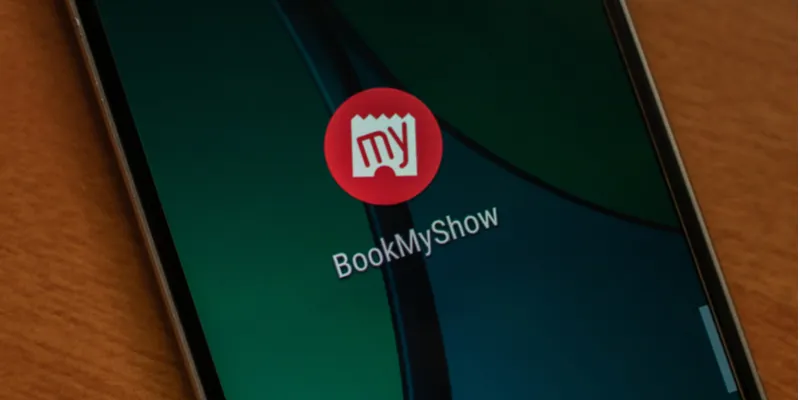Moviegoers may come back to cinema halls sooner than expected: BookMyShow Co-founder
Ashish Hemrajani, Co-founder and CEO of Bigtree Entertainment, that operates BookMyShow, is confident that the entertainment industry will weather the coronavirus crisis and come back strong.
One of the most adversely affected industries amidst the coronavirus pandemic has been the entertainment industry. With the majority of the population being confined to their homes, not only has outdoor production taken a back seat, several production houses have turned to OTT (over-the-top) such as Amazon Prime, Disney+ Hotstar and Netflix, to release their films.
Movie theatres have remained shut since March-end when the first phase of lockdown was announced by Prime Minister Narendra Modi. Even as ‘Unlock 3’ starts in August, with several more restrictions being lifted, cinema halls have been directed by the government to stay closed. So what does this mean for companies in the outdoor entertainment industry?
Founder and CEO Shradha Sharma caught up with Ashish Hemrajani, Co-founder and CEO, Bigtree Entertainment Private Limited, which operates BookMyShow, to understand the company’s survival strategy amidst the current crisis.

Ashish Hemrajani, Founder & CEO, BookMyShow
Following his passion to become an entrepreneur, Ashish took the plunge in 1999. Post the dot-com bust, encouraged by the growth in multiplexes and the increasing digital payments penetration in the country, he launched in 2007. Today, it is India’s largest online entertainment ticketing platform.
The COVID-19 impact
Talking about the impact of COVID-19 on BookMyShow, and the entertainment industry at large, Ashish says that the world has seen and experienced a similar situation twice before -- once during the dot-com bust around 2001, and again during the global recession of 2008.
“We are now looking at the lessons we have learnt in 2001 and 2002, and we have revisited all the lessons that we have learnt at that time,” Ashish says. Under Ashish’s leadership, Bigtree survived the dot-com bust in 2001 by selling the Vista ticketing software and providing back-end ticketing services to cinema theatres.
Good times and bad times are a part of life, Ashish believes, while remaining confident that it’s only a matter of time before things get back to normal again.
He says, “In good times, people forget the bad. And in bad times, people forget the good. Memories are very short...Just like the stock market and businesses, life is cyclical... Humans are social animals and we are going to come back. What, how, and when, we need to find out.”
Ashish says that the social fabric has been dramatically affected by the pandemic, and the subsequent need to maintain a social distance. However, he believes that India’s favourite pastime continues to be movies and cricket, and it’s only a matter of time before people come back to the theatres to watch movies.
According to Ashish, pausing economic activities until a vaccine for coronavirus is made available, does not make sense. However, he is quick to add that stringent measures need to be taken while reopening movie theatres. Measures like -- having more shows, and lesser density of seats; having alternate shows in screens, to ensure that they are deep-cleaned; and giving out masks for free, like how 3D glasses are distributed before shows.
“They (Indians) may surprise us by coming back sooner than we think,” he adds.
Watch the interview here:
Improvisation is the name of the game
After the pandemic hit, BookMyShow almost immediately had to cut costs, in order to stay nimble. The platform went digital on the fifth day of the nationwide lockdown. Ashish reveals that the founders and leadership team at BookMyShow took a 50 percent salary cut, while “working harder than ever,” he adds.
While BookMyShow’s business is more of a ‘weekend business,’ the team has to work throughout the week to engage users. It has expanded its categories and has launched a watch-guide for individual users, listing shows and movies from across all OTT platforms. It has also been conducting live virtual concerts and shows, where it has hosted the likes of Vir Das, Prateek Kuhad, and Monica Dogra.
Ashish also revealed that BookMyShow has been recording 15,000 to 20,000 concurrent users for its live concerts, where artists perform from their houses. The platform has been generating revenue from sponsorships and partnerships. However, he’s quick to add that, “This is not a time for profit… everybody is hurt and we want to give back.”
BookMyShow has a clear strategy -- it raises capital when it does not need to. “We are sitting on a tonne of cash. Today, anybody who is liquid and has cash, can experiment, innovate, and can think about mergers and acquisitions and acqui-hires,” Ashish says. However, at this point of time, if one has limited cash, they will constantly think about survival, and this will prevent them from innovating or putting together strategies to implement.
OTT vs theatre
Commenting on the competition OTT platforms pose to movie theatres, Ashish points out that movies have been a big part of India’s social fabric and that it is a ‘generational thing’ to visit theatres and watch movies.
India is characterised by harsh climatic conditions and there is almost always a lot of chaos on the streets. Thus, Indians seem to be ‘indoor people,’ and prefer indoor entertainment, he says. The unique selling proposition that cinema halls have been offering so far is that they are air-conditioned. Currently though, with theatres closed, people are watching new releases on OTT platforms. However, not all of India has smart TVs, internet, or the means to afford an OTT subscription. “There is a price point issue,” says Ashish.
Thus, he concludes that along with movie theatres and live concerts, OTT will co-exist. “It is not going to be one against the other,” he adds.

The BookMyShow thesis
“Valuation is a vanity metric,” Ashish says. He believes that valuation is the by-product of the things that one puts into a business. In many situations, valuation is artificial.
“You have to realise how much you are diluting (equity). More companies die out of indigestion than starvation,” he says. Recently, BookMyShow did a commercial transaction worth hundreds of crores, and that, without giving away zero percent of its equity. Ashish says that it was a commercial transaction that was symbiotic and a long-reaching, five-year-long transaction.
Ashish goes on to say, “Why aren't more companies thinking of doing dhanda how dhanda should be done (Doing business how it should be done)?”
He advises founders to think about their value systems and consider not diluting equity during every transaction. Equity is the most expensive way of fundraising and businesses with strong fundamentals should consider taking debts.

Image source: Shutterstock
Learnings from the crisis
“Life is a marathon and not a sprint,” Ashish says. Having experienced and survived the dot-com bust and the Great Recession, Ashish has some suggestions for entrepreneurs to weather crises.
Firstly, he says, entrepreneurs should be marathon runners. “Some of the biggest companies across the world and in India were not built overnight, they were built by entrepreneurs committing to the long course.” He suggests that entrepreneurs focus on their business and find ways to farm out new things from the existing venture, instead of thinking about valuation and exit. If one wishes to make more money, they should angel invest and help other entrepreneurs meet their dreams, and along the way, make money and be successful, is Ashish’s advice.
Secondly, Ashish says, “Don't get impacted by things which externally do not matter. The environment will keep changing, don't lose sleep over it.”
Thirdly, he says, “Stay in the money.” However, this does not always mean by raising money, but by involving in commercial and sensible deals. Additionally, entrepreneurs should thrive to make profits, reduce the burns, and focus on the EBITDA (earnings before interest, tax, depreciation, amortisation) and the bottom line. He says, “Surround yourself with investors who support your vision and are like-minded people.” One can raise as much money as they want, however, the magic comes from finding the right people or investors.
Lastly, he says that while building a business, entrepreneurs should remember that things are temporary and that “memories are short.” He advises entrepreneurs to be fair to their consumers, and in doing so, they (consumers) will never disappoint them, and will always come back.
“Given the tailwinds that people are sitting at home, having a device, cheap data (Reliance Jio) and connectivity, and a payments mechanism (UPI), what is going to come out of this will be nothing short of revolutionary,” Ashish says.
Edited by Ramarko Sengupta









